Contents
Mirabilis Night Beauty is an unusual plant that attracts with bright flowers and a strong aroma. The flower is unpretentious to growing conditions, pleases with flowering throughout the summer and autumn.
Description
Mirabilis Jalapa or Night Beauty is a representative of the Mirabilis flower genus. These are perennial herbaceous plants imported from Mexico. Under natural conditions, the flower grows in tropical forests. Today it is successfully grown in temperate climates.
Mirabilis is often grown as an annual. In cool regions, when winter sets in, the aerial part of mirabilis dies. The tubers are saved to grow a flower for the next year.
The height of the bush is from 30 cm to 1 m. Mirabilis stems are powerful, fleshy, erect or creeping. The root is thin, rod type. The plant forms tubers that help endure drought and cold snap.
Mirabilis leaves Night beauty dark green, simple, oblong, pointed at the ends. Most of the leaves are located at the top of the shoots. Mirabilis flowers are solitary, grow in corymbose inflorescences, have the shape of a funnel up to 2,5 cm in size.
The color of mirabilis depends on the variety. One bush can produce flowers of various shades from orange to purple. Often there are specimens with multi-colored petals.
The flower got its name from the Latin word “mirabilis”, which translates as “amazing”. It is called the night beauty because of its flowering at night.
Mirabilis flowers bloom after 16.00 and close only at dawn. In cloudy weather, the buds open during the day. The plant emits a delicate pleasant aroma.
After the flowering of Mirabilis, a large fruit of dark brown color is formed. Each box contains one seed. After collection, the shelf life of planting material is up to 3 years.
Photo Mirabilis Night Beauty:
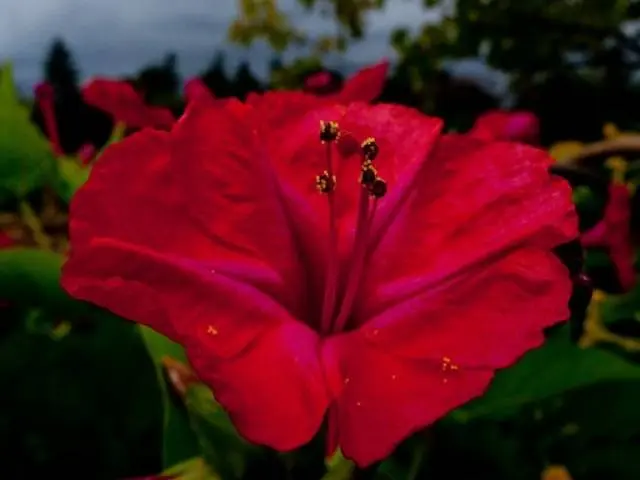
Application
Mirabilis is used in landscape design for a single planting or creating multi-flowered flower beds. High varieties serve as a hedge, undersized plants are planted to decorate borders and lawns.
Mirabilis grows well in a pot or flowerpot. In a flower bed, it is planted in the center or next to the fence. The bush grows quickly and fills the free space, it can oppress other plants.
Mirabilis Night beauty – looks spectacular in combination with certain plants:
- daisies;
- chamomile;
- marigold;
- lavender;
- lobularia.
It is best to plant mirabilis together with undersized and creeping flowers. Against the background of roses, dahlias, peonies and other large-flowered plants, mirabilis is lost and looks less impressive.
Mirabilis leaves are suitable for eating. Flowers contain pigments that change the color of food. They are used to make a raspberry-colored dye for coloring jelly and cake.
Mirabilis tubers have a laxative effect on the stomach. A decoction of the leaves is effective in the treatment of purulent inflammation. The seeds are poisonous.
Main grades
You can determine the miraibilis variety by the height of the bush and the shade of the flowers. When planting 2 or more varieties, cross-pollination occurs, and varietal qualities are lost.
red lollipop
Plant 90 cm high with smooth powerful shoots. Leaves oblong oval. The flowers reach 6 cm, have a scarlet color. Increased disease resistance.
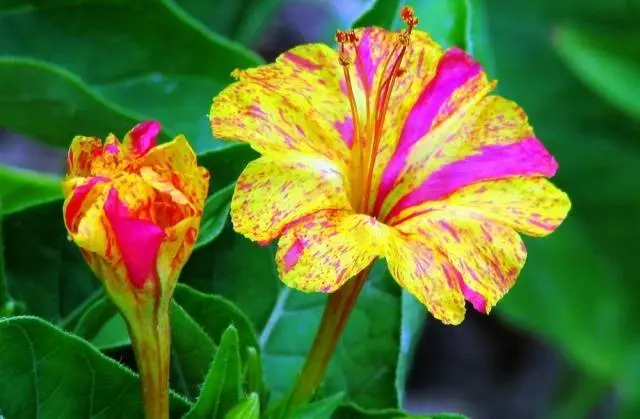
Tea Time Red
Mirabilis Tea Time Red is a dense bush of spherical shape. The stems are pale green in color, subject to branching. The leaves are elongated, smooth and much darker than the shoots.
The variety produces flowers of deep pink color. The variety remains resistant to temperature fluctuations and fungal diseases. Mirabilis blooms in summer and lasts until frost. The variety is suitable for growing in cool climates.
Photo of a Mirabilis flower Night Beauty of the Tea Time Red variety:
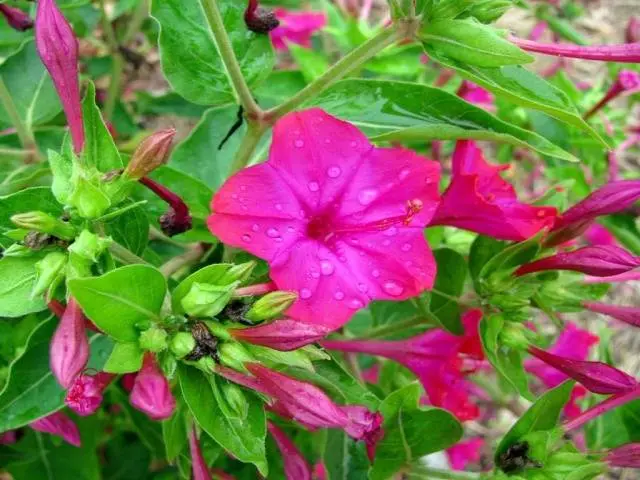
Elvira
Variety Elvira is a rounded shrub, the height of individual shoots reaches 1 m. The leaves are dark green, elongated, with pointed tips.
Mirabilis Elvara is distinguished by large flowers growing up to 4 cm. The color is variegated: white, yellow, purple.
Photo Mirabilis Night Beauty varieties Elvira:
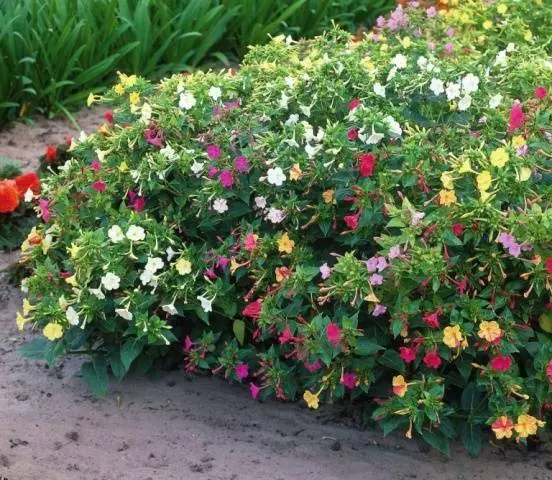
Iolanta
The Iolanta variety is a spherical bush, reaching a height of 0,5 m. The shoots are powerful, branching at the top.
The flowers have an original variegated color in the form of stripes. The first flowers are formed at the end of June, the next – before the onset of winter cold.

Salmon
The Salmon variety is grown as an annual. Mirabilis bushes reach 80 cm in height, flowers up to 25 mm in diameter. Flowering begins in June and continues until September. Salmon-colored flowers, in the center – crimson stains in the shape of a star.
Photo of a Mirabilis flower Night Beauty of the Salmon variety:
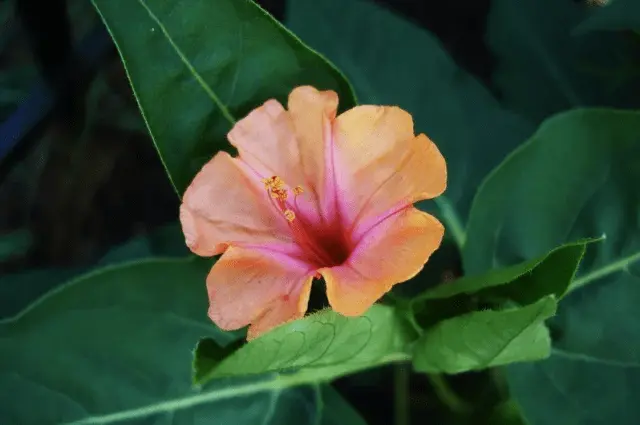
Cultivation
Mirabilis Night beauty is grown from seeds. More reliable is the seedling method. In a cold climate, seedlings will be obtained at home, after which they are transferred to a permanent place.
Seedbed method
Mirabilis seeds are planted at room conditions in March-April. Peat cups are pre-prepared to avoid picking plants. The substrate can be obtained by mixing soddy land, peat, humus and sand in a ratio of 2: 2: 1: 0,5.
The procedure for planting mirabilis for seedlings:
- Seeds are soaked in warm water for a day to stimulate germination.
- The cups are filled with prepared soil and watered abundantly.
- 2 mirabilis seeds are placed in each container, they are sprinkled with a thin layer of soil.
- Plantings are sprayed with warm water from a spray bottle.
- The containers are covered with a film and left in a room with a temperature of 18-20°C.
When shoots appear, the containers are rearranged into the light. With the development of 2 leaves in a cup, the strongest plant is left. Mirabilis is transferred to the soil in May into prepared holes and watered abundantly.
When the seedlings reach 15 cm, they are transplanted into larger containers. After picking, they are fed with complex fertilizer.
Landing in open ground
Mirabilis Night beauty prefers open areas warmed by the sun. The flower develops well on clay and loamy soils fertilized with lime. In acidic soil, the plant does not develop and dies.
Mirabilis seeds are planted in open areas at the end of April. Furrows 3 cm deep are preliminarily prepared. Seeds are placed in 8 cm increments, covered with earth and watered.
The planting site of Mirabilis is covered with a non-woven fabric until shoots appear. Plants are thinned out so that they do not interfere with each other.

Flower care
Mirabilis Night Beauty is easy to care for, as the flower is undemanding to growing conditions. In the heat, water the flower garden and loosen the soil. For abundant flowering, the plant is fed with organic fertilizers.
Watering
Mirabilis flowers Night beauty tolerates the lack of moisture and drought well. If the dry period is prolonged, this negatively affects the formation of buds.
Water is used from barrels after it has settled and warmed up. Mirabilis is watered under the root in the morning or evening. After watering, be sure to loosen the soil and eliminate weeds.
Additional fertilizing
Over the summer, mirabilis is fed 2-3 times. You can use both organic and mineral fertilizers. It is not recommended to use fresh organic matter, it is better to add compost.
Mirabilis feeding scheme:
- before the formation of buds;
- in the middle of summer;
- late summer to encourage flowering.
In the spring, nitrogen-based fertilizers are used: ammonium nitrate or urea. 10 g of the substance is added to a 10-liter bucket of water. In summer, a complex flower fertilizer with a minimum nitrogen content is applied. Mirabilis is watered with a solution under the root.
Trimming
In the summer, fading mirabilis inflorescences are pruned to stimulate the formation of new buds. There is no need to trim the shoots.
In autumn, the bushes are cut at the root. Mirabilis tubers can be used for planting next year. In autumn they are dug up and placed in a container with peat. Tubers are stored at a temperature of +5°C.
If mirabilis is grown on a balcony, then the tubers are left in a pot. The aerial part of the plant is cut off, and the containers are removed to the basement. Water them every 2 months to keep them from drying out. In the spring, the tubers are planted in an open area or in a pot.
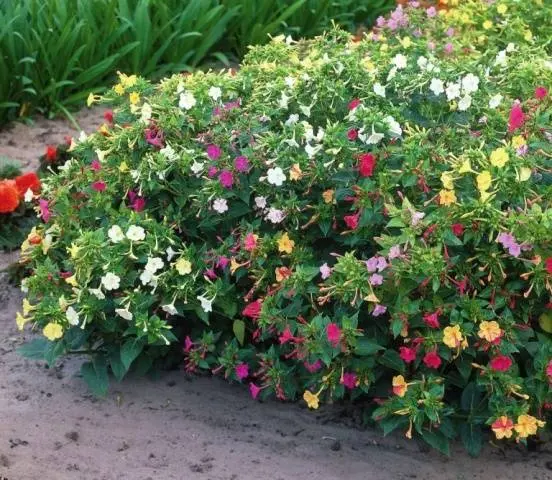
Protection against diseases
Mirabilis flowers Night beauty are disease resistant and rarely attacked by pests. With constant exposure to moisture, the plant suffers from root rot. It is determined by the withering of the leaves and early shedding of buds.
Root rot is not treatable. The affected plant is dug up and removed from the site. The soil is treated with a solution of the drug Fundazol.
When waterlogged, rusty spots appear on the leaves of mirabilis. This indicates the spread of the fungus. The affected stems and leaves are cut off, and the flower garden is sprayed with fungicides.
Conclusion
Mirabilis is notable for flowering at night. The variety is chosen depending on the shade of the inflorescences. The plant is resistant to drought, does not tolerate stagnant moisture. Mirabilis is propagated by seeds that are germinated at home or immediately embedded in the soil. The flower is ideal for decorating a recreation area in a summer cottage.









